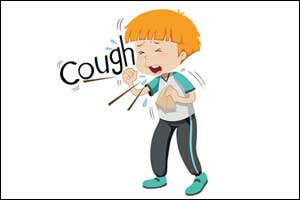- Home
- Editorial
- News
- Practice Guidelines
- Anesthesiology Guidelines
- Cancer Guidelines
- Cardiac Sciences Guidelines
- Critical Care Guidelines
- Dentistry Guidelines
- Dermatology Guidelines
- Diabetes and Endo Guidelines
- Diagnostics Guidelines
- ENT Guidelines
- Featured Practice Guidelines
- Gastroenterology Guidelines
- Geriatrics Guidelines
- Medicine Guidelines
- Nephrology Guidelines
- Neurosciences Guidelines
- Obs and Gynae Guidelines
- Ophthalmology Guidelines
- Orthopaedics Guidelines
- Paediatrics Guidelines
- Psychiatry Guidelines
- Pulmonology Guidelines
- Radiology Guidelines
- Surgery Guidelines
- Urology Guidelines
Management of Children with chronic wet cough: Chest Guidelines

American College of Chest Physicians (CHEST) has released updated 2006 Cough guidelines and recommendations for management of Children with a chronic wet cough.
A wet or a productive cough is common in children with a chronic cough. The guidelines expert group formulated recommendations based on systematic reviews related to the management of chronic wet cough in children (aged ≤ 14 years) based on two key questions: how effective are antibiotics in improving the resolution of a cough? If so, what antibiotic should be used and for how long? and when should children be referred for further investigations?
Combining data from the systematic reviews, they found high-quality evidence in children aged ≤ 14 years with chronic (> 4 weeks’ duration) wet/productive cough that using appropriate antibiotics improves cough resolution, and further investigations (eg, flexible bronchoscopy, chest CT scans, immunity tests) should be undertaken when specific cough pointers (eg, digital clubbing) are present. When the wet cough does not improve following 4 weeks of antibiotic treatment, there is moderate-quality evidence that further investigations should be considered to look for an underlying disease. New recommendations include the recognition of the clinical diagnostic entity of protracted bacterial bronchitis.
Following are the major recommendations:
- For children aged ≤ 14 years with chronic (> 4 weeks’ duration) wet or productive cough unrelated to an underlying disease and without any specific cough pointers (eg, coughing with feeding, digital clubbing), we recommend that children receive 2 weeks of antibiotics targeted to common respiratory bacteria (Streptococcus pneumoniae, Haemophilus influenzae, Moraxella catarrhalis) and local antibiotic sensitivities(Grade 1A).
- For children aged ≤ 14 years with chronic wet or productive cough unrelated to an underlying disease and without any specific cough pointers (eg, coughing with feeding, digital clubbing) and whose cough resolves within 2 weeks of treatment with antibiotics targeted to local antibiotic sensitivities, we recommend that the diagnosis of protracted bacterial bronchitis (PBB) be made (Grade 1C).
- For children aged ≤ 14 years with PBB with lower airway (bronchoalveolar lavage or sputum) confirmation of clinically important density of respiratory bacteria (≥ 104 cfu/ml), we recommend that the term ‘microbiologically-based-PBB’ (or PBB-micro) be used to differentiate it from clinically-based-PBB (PBB without lower airway bacteria confirmation) (Grade 1C).
- For children aged ≤ 14 years with chronic wet or productive cough unrelated to an underlying disease and without any specific cough pointers (eg, coughing with feeding, digital clubbing) when the wet cough persists after 2 weeks of appropriate antibiotics, we recommend treatment with an additional 2 weeks of the appropriate antibiotic(s) (Grade 1C).
- For children aged ≤ 14 years with chronic wet or productive cough unrelated to an underlying disease and without any specific cough pointers (eg, coughing with feeding, digital clubbing), when the wet cough persists after 4 weeks of appropriate antibiotics, we suggest that further investigations (eg, flexible bronchoscopy with quantitative cultures and sensitivities with or without chest computed tomography) be undertaken (Grade 2B).
- For children aged ≤ 14 years with chronic wet or productive cough unrelated to an underlying disease and with specific cough pointers (eg, coughing with feeding, digital clubbing), we recommend that further investigations (eg, flexible bronchoscopy and/or chest computed tomography, assessment for aspiration and/or evaluation of immunologic competency) be undertaken to assess for an underlying disease (Grade 1B).
- For children aged ≤ 14 years with chronic wet or productive cough unrelated to an underlying disease and without any specific cough pointers (eg, coughing with feeding, digital clubbing), we suggest that randomized controlled trials on the efficacy of different durations of antibiotics be undertaken in various clinical settings (particularly in primary care) to determine its influence on the number to treat and recurrence. When doing so, we suggest that validated cough outcomes and a-priori definitions be used(Ungraded, Consensus-Based Statement).
For more details click on the link: DOI: https://doi.org/10.1016/j.chest.2017.01.025

Disclaimer: This site is primarily intended for healthcare professionals. Any content/information on this website does not replace the advice of medical and/or health professionals and should not be construed as medical/diagnostic advice/endorsement or prescription. Use of this site is subject to our terms of use, privacy policy, advertisement policy. © 2020 Minerva Medical Treatment Pvt Ltd